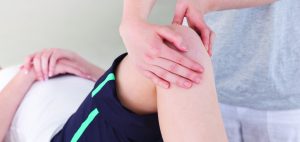Knee Injuries
Knee pain or knee injuries are extremely common, and there are many causes. The knee needs to function properly to provide flexible mobility while bearing considerable weight. While walking down the street, our knees bear three to five times our body weight. Many jobs, sports and recreation activities, getting older, or having a disease such as osteoporosis or arthritis increase the chances of having a knee problem.
Sudden (acute) injuries may be caused by a direct blow to the knee or from abnormal twisting, bending the knee or falling on the knee. Overuse injuries occur with repetitive activities or repeated or prolonged pressure on the knee. Activities such as stair climbing, bicycle riding, jogging, or jumping stress joints and other tissues and can lead to irritation and inflammation.
It is important to make an accurate diagnosis of the cause of your knee pain or injury so that appropriate treatment can be directed at the cause. Your physiotherapist will discuss the injury with you and estimate the time it will take to recover. Physiotherapy treatment for patients with this condition is vital to hasten the healing process, ensure an optimal outcome and reduce the likelihood of injury recurrence. Treatment may comprise:
- As soon as possible, and for 72 hours after injury, use the RICE method:
- Rest -Take it easy and only move within your limit of pain.
- Ice -As soon as possible, and for 20 minutes every two hours, apply ice or a frozen gel pack wrapped in a damp towel. This helps to control bleeding and pain and reduces secondary tissue damage.
- Compression -Firmly bandage the knee and include 5 cm above and below the joint. This helps to control swelling.
- Elevation -As much as possible, elevate your leg higher than the level of your heart to reduce swelling.
- Joint mobilisation
- Electrotherapy (e.g. ultrasound)
- Soft tissue massage
- Taping
- The use of an appropriate brace
- Activity modification advice
- Biomechanical correction
- Exercises to improve strength, balance, flexibility, and fitness
- Muscle-strengthening program
- Hydrotherapy
- A gradual return to activity plan
- Correct footwear advice
Research findings have modified modern physiotherapy treatment approaches to knee pain. Together with a thorough knee and lower limb assessment, your knee treatment can progress quickly to get you pain-free and performing your normal sport or daily activities in the shortest time possible.

